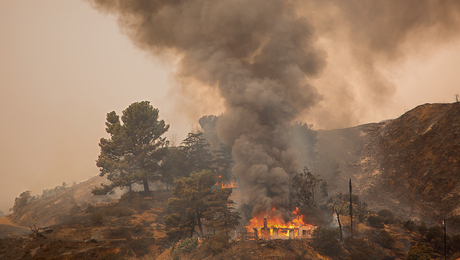*
I am looking for resources and suggestions for reducing road noise in both my home and yard, e.g. fencing materials and height, types of shrubs, etc.
Discussion Forum
Discussion Forum
Up Next
Video Shorts
Featured Story

These defensive details give homes a better chances of surviving wildfires.
Featured Video
How to Install Cable Rail Around Wood-Post CornersHighlights
"I have learned so much thanks to the searchable articles on the FHB website. I can confidently say that I expect to be a life-long subscriber." - M.K.
Fine Homebuilding Magazine
- Home Group
- Antique Trader
- Arts & Crafts Homes
- Bank Note Reporter
- Cabin Life
- Cuisine at Home
- Fine Gardening
- Fine Woodworking
- Green Building Advisor
- Garden Gate
- Horticulture
- Keep Craft Alive
- Log Home Living
- Military Trader/Vehicles
- Numismatic News
- Numismaster
- Old Cars Weekly
- Old House Journal
- Period Homes
- Popular Woodworking
- Script
- ShopNotes
- Sports Collectors Digest
- Threads
- Timber Home Living
- Traditional Building
- Woodsmith
- World Coin News
- Writer's Digest


















Replies
*
Short of an earth berm or concrete wall, you will have hard time of it. Think absorbtion and reflection. The closer you get to the source of the noise for reflection the better.
If the traffic speed is high, then tire noise is high and its also higher frequency, which reflects better.
To absorb noise you need high density and plantings are difficult to get high enough density to absorb much.
I remember seeing in Pop Science a few years back about a planting thing that was a tiered planter developed somewhere in Europe that worked fairly well.
You know we get into the thing about sound and decibels and the human ear response and I guess the simplest non technical explanation here is that you will have to cut the sound level in half to just be noticible to your ears.
I know the highway dept here has used some noise fences made of 2X vertical boards on both sides of fence and 8 to 10 ft high. Certainly helps and can make a yard usable that wasn't.
BTW my back yard backs up to US 36 between Denver and Boulder, so ask me about highway noise.
*
Bad News. 30-40year old Highway. New Sub Division built next to highway. New residents complain of Highway noise.My state in it's infinite wisdom desides to spend several millions per mile installing concrete sound barriers. 18 months later tests show the sound barriers actually increased the sound levels in local area. And the sound could even be heard in areas that were previously problem free. This year the state is spending more to install some kind of plastic cushions on the concrete walls. How many bushes and evergreens can be installed for a couple of million bucks a mile? Glad I live in the older part of town away from this foolishness. Suggest good stereo speakers? Stephen
*Belive it or not, Blue spruce has been proven to be the most effective sound barrier. Most sound does come from tires. From what I have read, AA small bem topped with the spruce is about as effective as it gets
*
JJ - We've been working on the same problem in our house for 11 years. We've tried several things. They all have helped, to a varying extent; the combination of all of them is working pretty well.
Double paned windows and an eight foot sound wall have made the most significant difference for us. We can still hear the noise, but it sounds like it moved about half a mile away now. I always thought the wood fence and shrub plantings that were in the front helped some, but when we took them out to have the wall built we found they hadn't made a bit of difference after all.
The thing I notice about the wall is this - the noise doesn't go away - it is just redirected. So where the wall ends at our driveway, it is far noisier than it was before. In our case this works well; if the noise flowed along the wall and dumped out onto your house somewhere at a break it would be a mess.
I used to work at Disneyland and the berm that surrounds the park is amazing. It's 18-20 feet high and is planted densely with evergreen trees and shrubs. Almost no noise from outside the park penetrates the berm. If you have room for a berm, I agree that it will probably be the most effective way to mitigate noise.
*
Noise,
I sat for hours outside homes that I was looking at buying...sounds that are bothersome are all so different...the quietest site was the worst because their was no white noise to mask even an ant fart...and this site had a dog barking on the end of a chain a mile away in the valley that you would have thought was two feet away...Dogs barking,
can't think of a worse nuisance...Finally ended up on a short dead end side
street, right off the main drag, that's so quiet, I couldn't ask for more...(made
friends with the local yappers)
Location, location, location,
Jack : ) )(
*If you can't afford a fountain, there is always windchimes. Of course you (and/or your neighbors) may prefer the road noise!Rich Beckman
*Jack et alMany years ago my wife and I were contemplating the purchase of a large acreage of bush way back in the middle of nowhere. We instantly loved the place, but the one thing about it that bothered me was its proximity to a rail line that nudged one corner of the property about 1/2 mile from where we envisioned building our cabin. We checked with the nearest neighbour, whose house was no more than thirty feet from the track (no lie) and was assured by the old couple that had lived therei foreverthat it was a seldom used spur line. We visited the property several more times, always on Sunday for some reason, and subsequently purchased it. We both had always liked the sound of a train off in the distance and didn't worry about the rail line until we started building a year or so later. That's when we discovered that it was a heavily used i main linethat just happened to be seldom used on Sunday afternoons.We visited with the old folks every once-in-a-while and a train went through when we were having lunch with them one day. Their whole house bounced up and down (again no lie) but they were oblivious. It was so loud in their house I might just as well have had my head in the engine compartment!!!So much for rose coloured glasses, Sunday afternoons and asking the neighbours!! Hmmm. . . sounds like the makins' of a C&W toon.
*There isn't a lot you can do for road noise most of the time, unless you are far enough away.It's fairly easy to screen out high frequency (treble) noise with high density sound insulation (expensive sound batts), double pane or plate glass windows etc., but low frequency sound is very hard to get rid of. Distance and mass walls, like brick or solid concete exterior walls are about the only thing that are really effective. "Sound walls" of concrete block fences, do little for low frequency sounds (bass) as like the impact of an explosion, the shock waves can go around objects. They are not "line of sight" as much as high prequency noise is.Highway sound walls that curve have been known to actually focus sound into neighborhoods that previously didn't have much of a problem. Sound of course can easily bounce off hard smooth surfaces.The impact of a few trees for sound deadening or absorption is usually overrated according to an accoustics engineer I listened to. He supposidly helped update the section on sound in the Architectural Graphic Standards several years ago. His comment was that you needed distance and a whole stand of trees to have good effect.The problem of low-frequency vs. high frequency is often noticed in interior walls. The consonents of words, like "s-" or "c-" are easily blocked or filtered-out by good interior insulation, blocking the understanding of speech thru the wall. The lower frequency sounds of the "bla-bla" still can come through, and the bass of rock and roll music or impact noises (hammering, heavy footsteps, truck engines) sometimes doesn't seem to be blocked much at all.Fountains and wind chimes can help mask the sound to some extent if the noise level isn't too high. White noise.
*To add a question: What will the covenants allow? I am reminded of one subdivision in the Denver CO area that just had to suffer because the protective covenants combined with the county rules on fencing/berms/etc would not allow anything that would be effective in stopping sound.Perhaps someone from the LA International area could make a contribution. I seem to recall some years ago there was a major project to sound insulate houses in the airport area.
*Scene: Elwood brings his brother to his apt. for the first time. The elevated train track is right outside the window.Joliet Jake: How often does the train go by?Elwood: So often you won't even notice.
*
Hi,
Pardon the PLUG, but we have a product that is right on topic.
Loewen Windows manufactures a sound attenuating window - we call it Tranquility Glazing. This optional system is available in almost all of our window and door products and consists of a specially designed accoustical glazing system which offers strong reductions to interior noise. Our fully operable casement windows test to an STC (Sound Transmission Classification) rating of 40. To put this in perspective, the 'average' residential casement window would perform in the STC 28 - 32 range. Tranquility windows achieve this high sound transmission classification WITHOUT an additional fixed storm panel.
In addition to offering a partial solution to noise problems, Tranquility windows provide all of the aesthetic and functional advantages of our line of West Coast Douglas Fir windows. Also, Tranquility offers exceptional UV protection (blocks over 98% of UV rays), tremendous security (the use of laminated glass on the inside of the sealed unit makes opportunistic forced entry difficult) and strong thermal performance.
See our website for further information (www.loewen.com)
E-mail us for the name of a dealer in your area; we have over 1000 dealers...in more than 15 countries.
[email protected]
Regards to all,
Mitch Toews
Loewen Windows
*
JJ, forget all those ultra lame suggestions about blocking, deflecting, creating white noise, etc!
Go out and hire Marilyn Manson, to set up his band and crank out the tunes (full blast, of course), between the highway and your house!
I'm sure you will never hear a car go by again!
Always helpful,
*BleuYou silly savage. How can something that eats rodents taste like something that eats. . . what the helli dochickens eat anyway?b "I like chickens, they taste just like poultry"
*
I am looking for resources and suggestions for reducing road noise in both my home and yard, e.g. fencing materials and height, types of shrubs, etc.